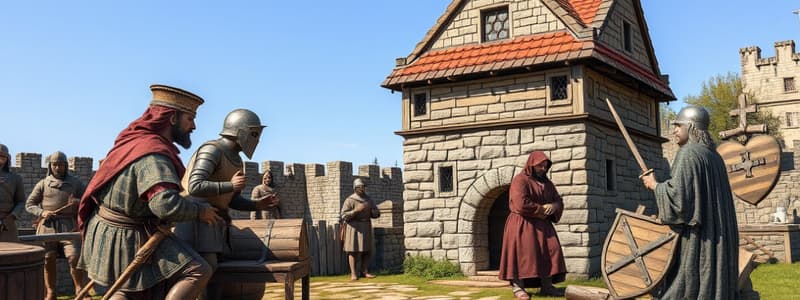Podcast
Questions and Answers
What is the Inquisition?
What is the Inquisition?
- A Roman Catholic tribunal for investigating heresy (correct)
- A system of European governance
- A type of medieval festival
- An art movement in the Renaissance
What is a serf?
What is a serf?
A person bound to the land and owned by the feudal lord.
What does the Manorial System refer to?
What does the Manorial System refer to?
A self-sufficient economic structure involving the Lord and peasants or serfs.
What is the Feudal System?
What is the Feudal System?
Who is a knight?
Who is a knight?
What is a vassal?
What is a vassal?
What were the Crusades?
What were the Crusades?
What was the Renaissance?
What was the Renaissance?
What was the Bubonic Plague?
What was the Bubonic Plague?
What was the 100 Years War?
What was the 100 Years War?
What was the Spanish Inquisition?
What was the Spanish Inquisition?
What initiated the Reformation?
What initiated the Reformation?
What are indulgences?
What are indulgences?
What are the 95 Theses?
What are the 95 Theses?
What was the Counter Reformation?
What was the Counter Reformation?
What were the Wars of Religion?
What were the Wars of Religion?
What was the Thirty Years War?
What was the Thirty Years War?
What was the Edict of Nantes?
What was the Edict of Nantes?
What was the Treaty of Westphalia?
What was the Treaty of Westphalia?
What is Shi'a Islam?
What is Shi'a Islam?
What is Sunni Islam?
What is Sunni Islam?
What was the Battle of Kosovo?
What was the Battle of Kosovo?
What are Janissaries?
What are Janissaries?
What was the Battle of Chaldiran?
What was the Battle of Chaldiran?
What was significant about the Battle of Panipat?
What was significant about the Battle of Panipat?
Flashcards are hidden until you start studying
Study Notes
Inquisition and Religious Context
- Inquisition refers to a Roman Catholic tribunal for investigating heresy, notably active in Spain during the 1400s.
- Spanish Inquisition involved violent methods to convert Spain back to Catholicism, utilizing torture and fear.
Socio-Economic Structures
- Serfs were bound to the land and owned by feudal lords during the Middle Ages.
- The Manorial System represented an economic structure where lords and peasants maintained self-sufficient manors through agricultural production.
Feudal and Military Hierarchy
- The Feudal System involved land exchange among lords in return for service from knights, establishing a hierarchical society.
- Knights were originally noble-born individuals trained in arms and chivalry, crucial for military service.
Religious Wars and Movements
- The Crusades (1096-1291) aimed to reclaim Jerusalem, marking a conflict that weakened Byzantines and opened up trade but led to failures after initial success.
- The Reformation began in 1517 when Martin Luther challenged Catholic practices, sparking theological debates and contributing to colonization motives in the Americas.
The Spread of Disease and War
- The Bubonic Plague ravaged Asia and Europe in the mid-14th century, killing millions and causing significant societal disruption.
- The Hundred Years' War (1337-1453) between England and France began over claims to the French throne, leading to significant changes in warfare.
Protestant Reformation and Counter Reformation
- Martin Luther's 95 Theses criticized indulgences and propelled the Protestant Reformation, emphasizing discontent with the Catholic Church.
- The Counter-Reformation was the Church's response, reaffirming the authority of the Pope and the veneration of saints.
Wars of Religion
- Wars of Religion involved conflicts across England, France, the Netherlands, and the Holy Roman Empire, motivated mainly by religious disputes as well as socio-economic and political tensions.
- The Thirty Years' War (1618-1648) stemmed from conflicts between Protestant and Catholic factions within the Holy Roman Empire.
Key Treaties and Decrees
- The Edict of Nantes (1598) aimed to restore peace in France by defining rights for French Protestants amid religious conflicts.
- The Treaty of Westphalia (1648) concluded the Thirty Years' War, granting rulers the authority to choose their religion, either Protestant or Catholic.
Islamic Sects and Conflicts
- Shi'a Islam advocates for leadership through familial lineage, while Sunni Islam recognizes the fourth successor, Ali, as the rightful leader in the Ottoman Empire.
- The Battle of Kosovo involved Ottoman Turks defeating Christian forces, solidifying Ottoman control over the Balkans.
Military Innovations and Empires
- Janissaries, converted Christian boys, were trained to serve the sultan, showcasing the unique military practices of the Ottomans.
- The Battle of Chaldiran symbolized the major clash between the Safavid and Ottoman empires, a religious war between Shi'ites and Sunnis.
- The Battle of Panipat marked the beginning of the Mughal Empire and was notable for the use of gunpowder firearms and field artillery.
Studying That Suits You
Use AI to generate personalized quizzes and flashcards to suit your learning preferences.




